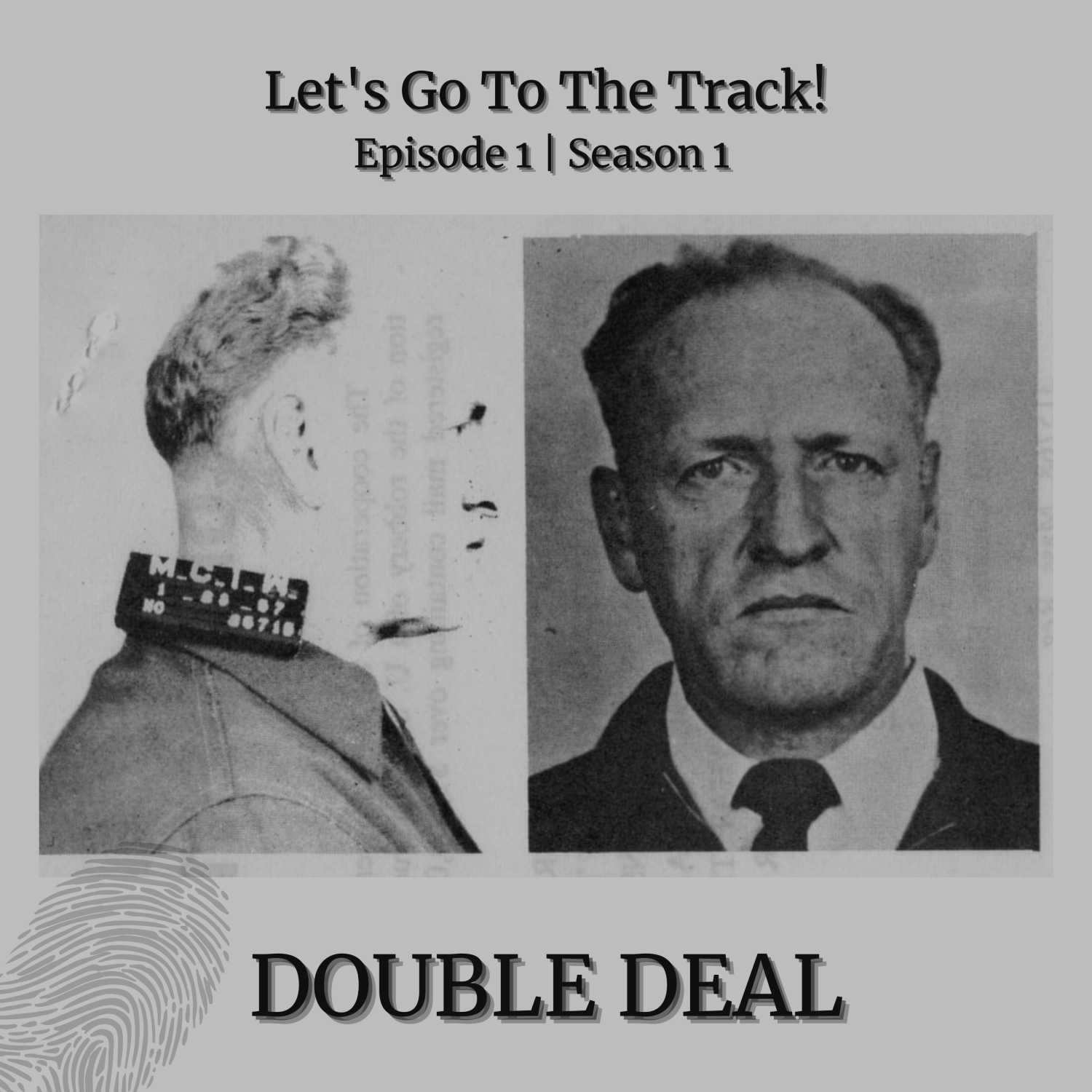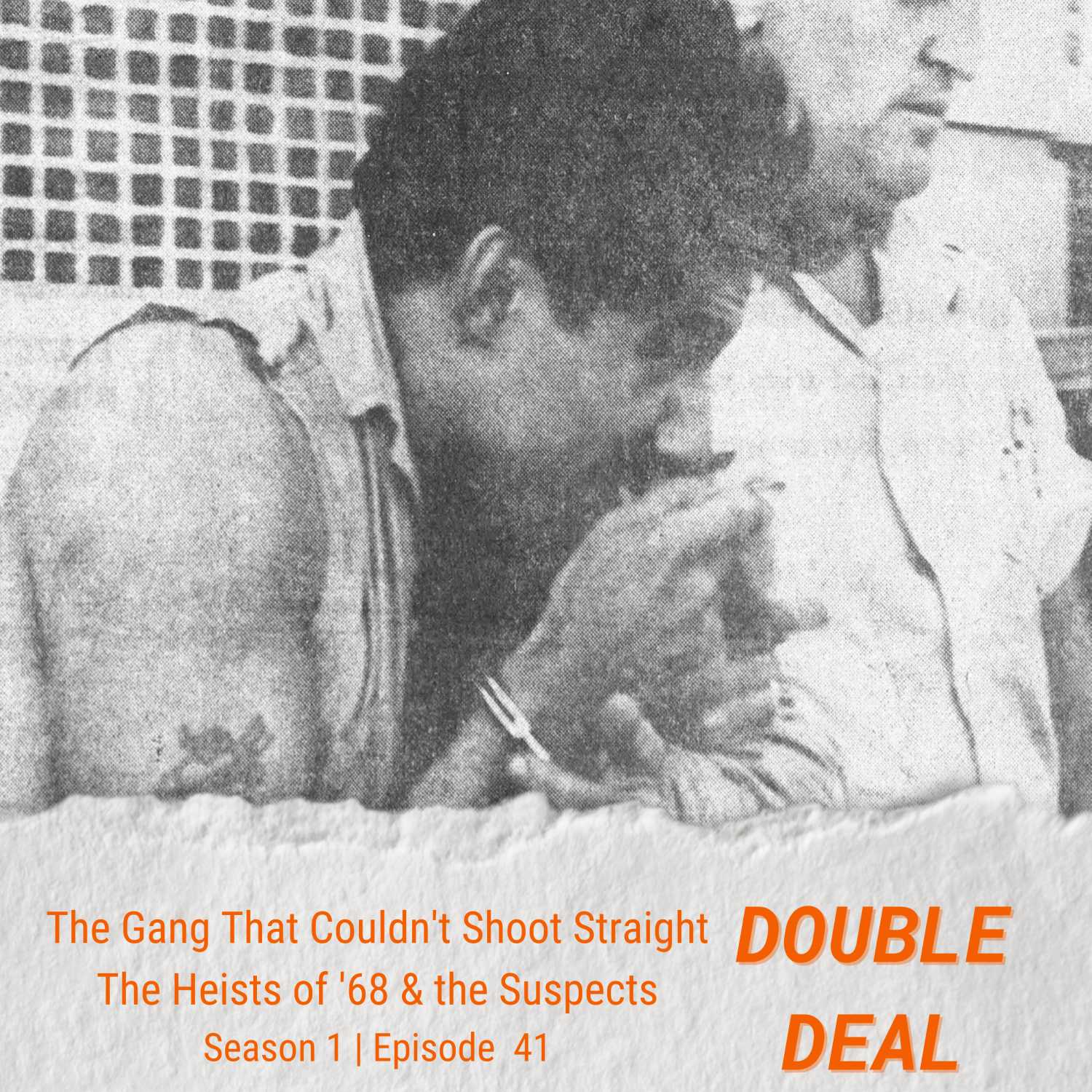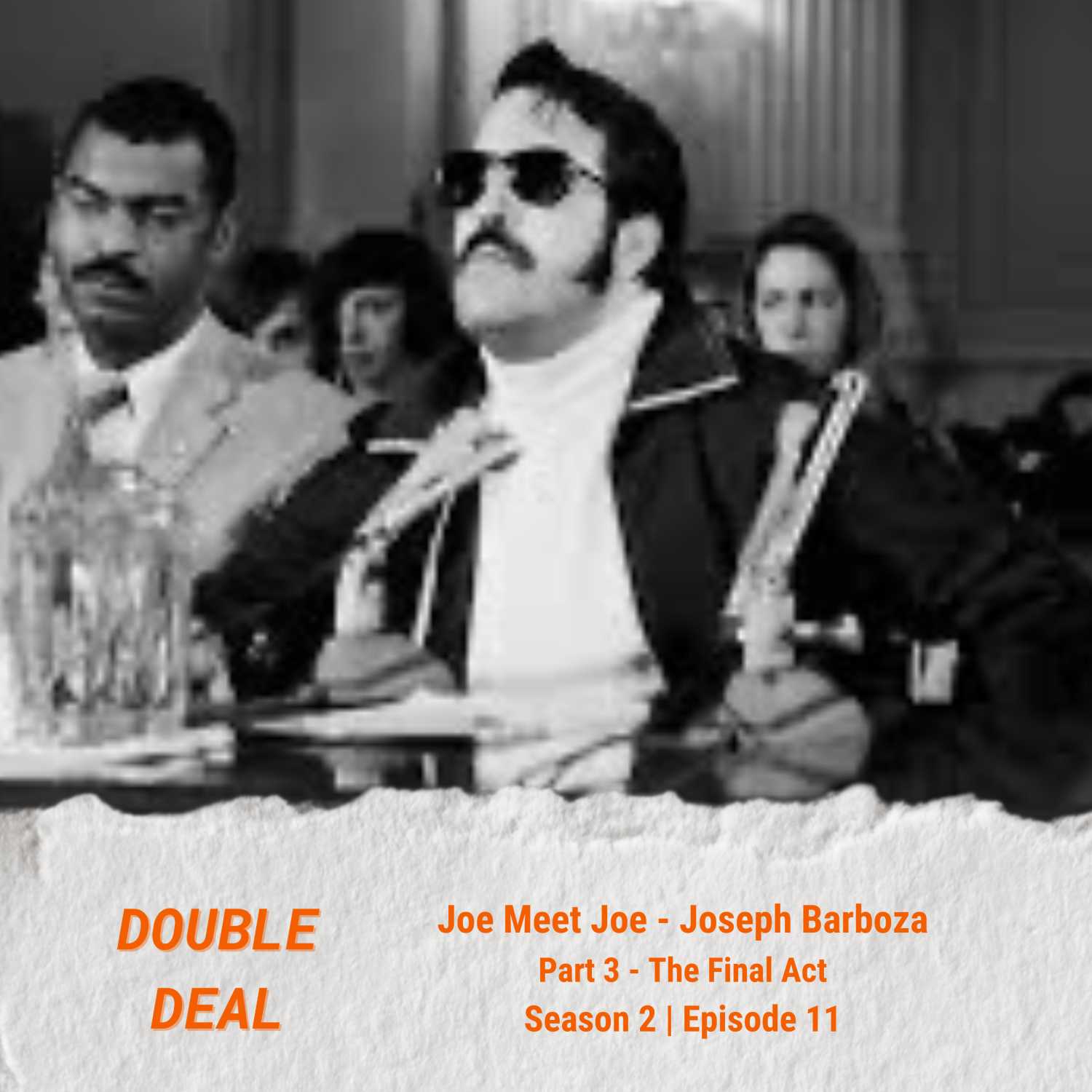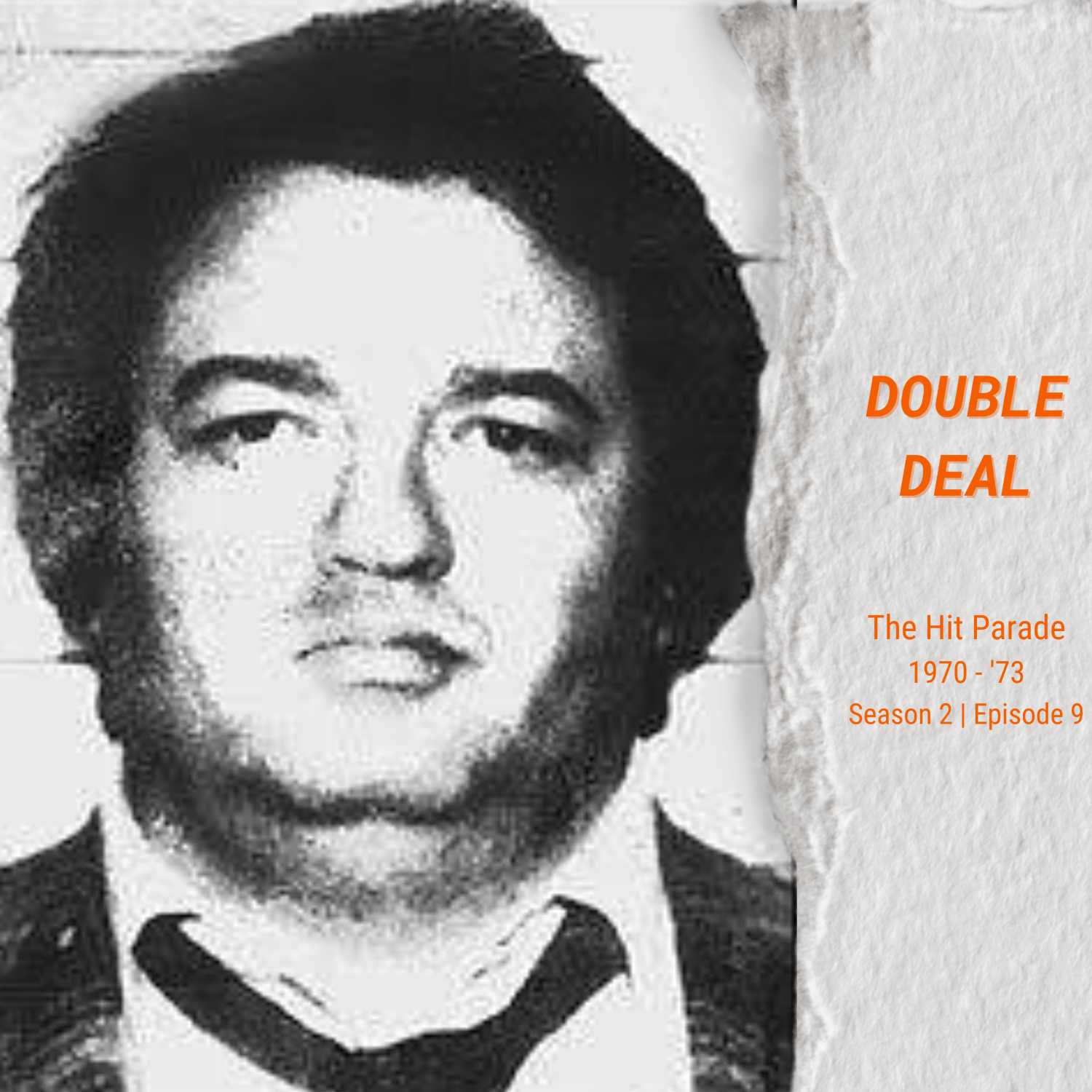Let's Go To The Track! - John J. "Red" Kelley - The Early Years

Jack Kelley was called "Swiss watch" for the precision with which he planned robberies. But a simple trip to the race track led to his first arrest. This episode will cover the early years of John J. Kelley's criminal career. We will discuss several of his early robberies and how a trip to the race track lands him in prison.
You can find us on Twitter, Facebook and Instagram. If you'd like to email Lara you can reach her at lara@doubledealpodcast.com and Nina can be contacted at nina@doubledealpodcast.com
For show notes and supporting materials please visit or website and click on episode 1.
Thank you for listening!
All the best,
Lara & Nina
Lara:
Hey everybody! Welcome to Double Deal and thank you for joining us. Before Nina and I get started on our first ever episode, I need to warn you about a few things. Well, warn you about me! I’ve got a mouth like a drunken sailor on shore leave, so if an occasional or more likely frequent f-bomb is a problem, it might be time to hit the pause button. But I really hope you don’t do that! We’re telling stories about street guys and a few girls, spectacular and unsolved crimes and a hefty dose of double dealing and intrigue. Many of the subjects we will be discussing here are raw and gritty, but almost as many are funny as hell. I’m not going to preface my words in any of our episodes with “I’m not condoning this sort of thing” or “not that I approve of such things”. We’re here to tell you stories, and we hope you find them as interesting and entertaining as we do. Ok, enough of me. Nina, let's hear from you.
Nina:
Hi everyone! You already know she’s the loud one, so I guess that should tell you I’m the quiet, rational one. Lara and I have been friends for nearly a decade. We both love research and solving mysteries. For the past two years we have been working on our forthcoming book about Lara’s late father, Richie. I’m the self-proclaimed Queen of redacted FBI reports. The stories we have uncovered deserve to be told. Especially those of people wrongly convicted. I hope you enjoy listening to them.
Lara:
Super! We’ll be posting transcripts of each episode on Spotify and supporting documents and photos on our website. So check us out. All of our social media links are in the show notes below. And since I have no shame, or at least that’s what my aunt Helen always told me, please follow us, like our social media posts and all that other good stuff. Questions, comments, suggestions and constructive criticism are always welcome. Crazy trolling, keep it to yourself. Nina and I are both seasoned Twitter vets, so save your energy.
Now let’s get into the early story of John J. Red Kelley. Since part of each episode will be told from Richie’s perspective, we’ll call him Jack. I was too young when Jack went away to remember him, but I heard endless stories about him. For nearly a decade, Dad was Jack’s wheelman. It wasn’t until I was grown that I really understood why and how dad could always be on the move. It was insane. Up at the crack of dawn no matter how bad he tied one on the night before, and behind the wheel all day. He put 75,000 miles on his car every year. When you spend that many years of your life doing something it becomes part of you. If someone who didn’t know his past happened to be in the car, and asked him “how do you know all these side streets?” He’d tell them “I drove a taxi.” I’d roll my eyes and stare out the window. I can’t tell you the endless hours I spent with him cruising around. Riding on the same roads he traversed endlessly with Jack planning heists throughout the 1960s. Somehow, I became dad’s surrogate Jack. Although I bitched to no end about being stuck in the car, I’d give anything for one more ride with him. I miss those days. Now, Nina, tell us a little about Jack’s background.
Nina:
Jack was born on June 3, 1914 to Patrick and Margaret Kelley in Watertown, Massachusetts. His parents were from Dublin and he had 2 sisters and 1 brother. Sometime before 1930 his mother remarried a man whose surname was Derderian.
Lara:
So that’s where the rumor about Jack being Armenian came from, and probably a few of his many superstitions. You know when they were planning a score, all the bird shit on the car had to be preserved with newspaper. Dad would have to jump out and stick a piece of newspaper over any fresh dropping Jack would see. He’d say you could barely see through the windshield. Weeks and sometimes months of crap covering everything.
Nina:
That’s disgusting!
Lara:
But hey it worked for him. We’ll get into Jack’s road rules in a later episode. When we were doing our research for the book, I came across my grandmother’s obit. Jack was listed as her foster son. I was surprised by that. My uncles and dad always said that grandma adored Jack. He and Richie would take her out for rides which she loved. But the foster son thing is still a mystery to me. There’s no one left to ask. He was missing from the 1930 census, so maybe there was some truth to it. But we also know from our research that he had a relationship with his mother throughout the 60s. I was always under the impression that dad met Jack in the can. We’ll probably never know the true answer to that.
Nina:
That is really strange. I tried to find something concrete about where he was in 1930. I mean he was only 16, but I couldn’t come up with anything. He pops up in the 1940 census, though. He’s got a wife and a kid. They’re living in Somerville. Everything seems normal and quiet for a long time.
Lara:
Were you ever able to find any military records on him?
Nina:
Nope. I know we both looked, but it was a dead end.
Lara:
So strange. He was the right age, perfectly healthy, not in prison, yet we couldn’t even find a draft registration card.
Nina:
Well, you know I like to imagine he was a spy during the War.
Lara:
Me too! You know one of his nicknames was “Swiss watch” because he operated with such precision. Always reminds me of someone who had military training. So when did he start robbing?
Nina:
Well, I think it was long before 1949. But in April that year the Copley Square Hotel was robbed of $15,000 by three men. The intriguing thing about this robbery was that there had been another robbery just a few hours earlier in Dorchester. There were also three perpetrators in that heist, but they only took down $5,000. The police tried to make a connection between the two robberies but were unsuccessful.
Lara:
Were there any distinguishing differences between the robberies?
Nina:
In the Copley Square Hotel case, the three men waited outside the hotel until they saw the payroll delivered and the armored truck drive away. Once the coast was clear, they entered the hotel and went directly to the second floor offices where the payroll had been dropped off just moments before. The door to the accounting department was locked, but one of the men knocked, and an employee answered. The men took the still unopened bags of cash that had only just been delivered and escaped out the rear entrance of the hotel, disappearing into the crowds. According to eyewitnesses, all three men were armed with revolvers, and disguised with dark glasses and handkerchiefs over their faces. They were all judged to be about six feet tall and in their mid-twenties.
In Dorchester, the police believed that there was also a getaway driver. They eventually gave up on the theory of one crew, and figured out that there was a second group operating.
This was the third in a series of payroll robberies that took place in 1949. By October of that year, the total reached nine. The others were all under $10,000 except two.
Lara:
Do you think he was friendly with the other crew that was operating at that time, and planned his scores around their schedule as a diversion?
Nina:
I would say so. In August of 1949 an unlocked armored car in Brookline was hijacked and robbed as the guards were collecting the tithes from a church. The police initially thought only $15,000 had been taken, but upon further investigation, it was revealed that $40,000 was missing from the truck. The local police chief called the robbery “well planned and carried out with a maximum of efficiency.” After hijacking the truck, the robbers drove to a secluded area and transferred the bags of money from the truck to a sedan. The police were so close behind them that they barely got away. In fact they were in such a hurry they left behind some loot.
Lara:
That fits Jack’s pattern. No shots fired, precise and clean. They left behind money at Copley Square too. They had another close call like that in the 60s with the Quincy armored truck score. Dad said Jack NEVER deviated from his plans. Never. They had a time schedule and they had to stick to it. If you dropped a bag of cash or missed a bag there was no going back for it. One minute in, one minute to take care of business, one minute to get out.
Nina:
You’re thinking of the Copley Plaza Hotel payroll robbery in October 1949. Very similar MO. Two tall guys, dark glasses, handkerchiefs. They left behind four grand in pay envelopes, but got $12,000 from a bag that a hotel employee was carrying. The employee struggled a bit before one of the men knocked him in the wrist with the butt of his gun, forcing him to drop the bag. They escaped through the crowded lobby to the street, and jumped in a stolen car they’d parked. The cops found the abandoned car in the South End. And the trail went cold after that.
Lara:
Well I’d say that we could probably give Jack credit for that score too. Another score that I suspect Jack might’ve had a hand in was the Great Brinks Robbery. Don’t say it! I know I have to wait for episode number 3.
Nina:
Exactly and that was the next big heist in Boston just a few months later.
Then on October 30, 1950, two men robbed the Newtonville branch of the Newton National Bank. They were armed with submachine guns this time, rather than revolvers. And instead of the kerchiefs and dark glasses, they were wearing Halloween masks. The Halloween masks were reminiscent of the Brinks earlier that year. In fact, at the time the press noted that there were striking similarities to this robbery and the Brinks job “in timing and technique”. The getaway driver this time was a man in drag, wearing lipstick, rouge, and a kerchief on his head. They took over $50,000 from that job.
Lara:
The Halloween masks and a guy dressed in drag will also make appearances in Jack’s future heists. One of those being the Plymouth Mail Robbery. Episode 16 will be dedicated to that case, but Plymouth will be a recurring theme in season one. The Newton National Bank robbery is the last robbery that Jack and his crew commit in 1950, but then they hit the National Bank in Somerville.
Nina:
That’s right. In July of 1951 they rob the National Bank in Somerville of $33,000. The holdup occurred just as the bank was opening on a Friday morning. Same MO with the masks and submachine guns. They were dressed as policemen this time. The descriptions fit Jack and his partner, Billy Aggie.
Lara:
Fucking Billy! Our next episode is about Billy Aggie. It’s going to be great! We’ve got a bank robber on a lawnmower, sideswiping a car driven by a priest who then has to give Billy the last rites because a cop shoots him in the gut all while Billy’s mother’s funeral is going on. Who decides to go rob a bank while their mother is being buried?
Nina:
Billy! That’s who! I don’t know how we’re going to keep ourselves from laughing through recording that. Anyhow, as in all the other heists, no shots were fired. The men again left money behind in their efforts to make a clean getaway. A driver in a black sedan with smudged plates was waiting for them. By now Jack and Billy had come to the attention of the FBI. We will come back to that in a bit, though.
Lara:
When the branch manager took down the plate number, the cops traced it to a guy who was up in Maine. All roads seem to lead to Maine at some point in our stories. Drives me nuts. Alright, the next score was the Newton Waltham Bank. It was robbed of $30,000 in September of 1951. By the way, I have to say “Waltham” because Nina’s not from Boston. Californians have strange accents compared to us. “Waltham”
Nina:
You’ve got nerve talking about accents. Don’t get me started. Ok, during this robbery they were dressed in Marine fatigues, but still had the Halloween masks. The taller of them, Jack, had a submachine gun as always. The smaller guy was Billy Aggie. He leapt over the counter and collected the bags. Again they left money behind. By this time, the authorities had calculated that they’d collected $125,000 in an 11 month period.
Lara:
Not too shabby for any time let alone 1951.
Nina:
Nothing to sneeze at. It looks like Jack and his crew took another break. Jack liked to work in batches. But who else was in his crew besides Billy at that time?
Lara:
Newton and Somerville were two-man jobs. Definitely Jack and Billy. My mind immediately jumps to Sonny Diaferio being the lipstick and rouge wearing getaway driver, but he was only about 19 or 20 then. More than likely it was Ben Tilley. They had a long history, and I suspect they were running together way before ‘49. Tilley used to do B and Es with Raymond Patriarca back in the ‘30s out in Worcester. Also Ben and Jack used the same lawyer, Sobol. Jack didn’t just pick Sobol’s name out of a hat. So I’m leaning towards Tilley as being our second man. Remember Billy was a hero in WWII, so he definitely wasn’t working with Jack in the early days. So there were four on the Waltham job. I suspect the fourth might have been Armand Caprioli. He was a driver for Jack before dad was. My mom wrote in her journal that uncle Armand and dad took us home from the hospital. I was too little to remember Armand, but I remember the stories. The guys said he looked like an undertaker because he was always dressed in black with a big Borsalino hat. Someone killed him shortly after I was born. They shot him in the face. I became obsessed with him and his murder. The mystery of his death still haunts me. I’m sure part of that created my hunger for answers and information about Dad and his world later in life.
Nina:
How awful! Do you have any photographs of him?
Lara:
No. Not anymore. But I remember what he looked like.
Nina:
Did they at least find Armand’s body?
Lara:
I believe so because anytime I heard his name it was inevitable that someone would mention how he died. The only information I found on him was the 1930 census. He was 11 at the time and incarcerated at the Lyman reformatory in Worcester, and 2 of the FBI 302s that we have. One he was listed as a bank robbery suspect along with dad and Pro, and one he was mentioned as Jack’s “sometimes driver.” But I know where you’re going with this, no body, no crime.
Nina:
No bullets, no time.
We’ll get into that in the middle of season one. As I mentioned earlier the Feds were onto Jack and his crew. They claim that after the 1950 robbery of the Newton bank, they began keeping an eye on Jack and Billy. But the authorities were never able to catch them at anything. Finally, in April 1951, it seemed to the Feds that they’d caught a lucky break. The Feds trailed them to Reno and watched them blowing what they later described as an endless supply of money in a casino. They picked them up, but were forced to release them due to lack of evidence. But the Feds never did say exactly who they picked up in Reno.
Lara:
Here’s the thing that doesn’t sit right with me about the gambling story. Jack wasn’t a gambler. He let the rumor spread over the years because it kept people from trying to get in his pockets. Plus it gave him an excuse for why he was borrowing money from the shylocks. When he was planning a score he didn’t want his guys doing risky petty shit, so he would go to the shylocks to finance their scores and keep everyone comfortable. He’d pay the vig along the way and then he’d pay down the principle after the score. Everyone believed the story that he was a gambler . Even in the Phil Cresta book there’s that scene where they’re sitting around in a diner trashing Jack for being a gambler. He was as frugal as the day was long. The man fed his cats from a teaspoon for cryin out loud.
Now Billy on the other hand was a degenerate gambler! In Richie’s words “Billy Aggie would bet on a fucking chipmunk if you strapped a saddle on it.’ So who did the feds pick up in Reno? Definitely Billy, but I highly doubt Jack was there.
Nina:
I definitely think you’re right that Jack wasn’t there. And like I said, the Feds never say who “they” were. But in the middle of all of this, it appears the Feds got a bit confused because there was another group of robbers operating in the same area at that time. Just like in the Copley Square heist, Jack would schedule his own jobs around the other crew’s jobs. The Harvey Bistany crew was caught in May 1952. We will be profiling some of the men from that crew later in the season.
Lara:
So when the Bistany crew got popped, Jack lost his decoy. That might explain why no big scores were taken down for the two and a half years following the Newton Waltham Job. Plus the heat that Billy picked up in Reno didn’t help matters.
Nina:
Yeah but then Jack got the urge or the need to rob again. On April 1, 1954, the Harvard Trust Company in Belmont was robbed mid-morning. Nearly $15,000 was taken. They were in the bank less than one minute. But Jack and his crew made a few mistakes this time. First, one of the robbers left a set of fingerprints. Then another fell in the mud when escaping and lost his hat.
Let me ask you something, Lara, what kind of superstitious Irishman commits a major crime on April Fools Day??
Lara:
Well it wasn’t like it was Friday the 13th. But for fucks sake, I’d be afraid the teller wouldn’t take me seriously thinking it was some kind of a sick gag, and I’d walk out empty handed.
Nina:
Even I’m too superstitious for that! Jack should have been too since it brings his lucky streak to an end. FBI Agent Edmund McNamara was at Jack’s place of business within hours of the heist to question him. McNamara was no stranger to bank robbers and their work. He’d been in charge of the Brinks investigation since the beginning. And Jack choked. He told McNamara that he knew what had happened because his step-daughter worked for Harvard Trust at another branch. He was unable to account for his whereabouts when the heist had taken place. McNamara knew Jack’s alibi was flimsy.
Lara:
I still say that Billy gave Jack up. He didn’t want to go to the can. There was a three and a half hour gap between the robbery and McNamara showing up at the car lot. Remember Billy was partners in the car lot with Jack. McNamara had to know that Billy was the weak link. Especially if it was Billy they picked up in Reno. He probably went to Billy’s house first, told him the story about the fingerprints and the hat. And Billy swallowed it and cracked.
Nina:
Either way, the Feds knew they had them. And even more so if Billy was being squeezed. Now all McNamara and his team had to do was wait for Jack to make his next mistake. They waited patiently for nearly two months. Then on May 25, Billy and Jack go to the Suffolk Downs racetrack. The cops had been waiting for them there for 10 days! The two of them got picked up at the $50 bet window. Jack had some of the bills stolen from the Harvard Trust robbery in his pocket. The cops arrest them both. But they release Billy that same day.
Lara:
So Jack takes his first pinch at the racetrack with Billy, and you mean to tell me Billy didn’t tip the Feds off? Come on! Billy must have been breaking Jack’s balls to go to the track for 10 days straight. It was the perfect place to ensure he’d have money in his kick. In the back of Jack’s mind he had to know Billy gave him up. Or maybe he just didn’t want to believe it was possible. Didn’t one of the news articles mention that he got the money from Billy?
Nina:
Yes, in one of the newspaper articles it mentioned that he received the money from Billy. The cops had search warrants for three homes and Jack’s place of business. They found three pistols. One of them was a .45 that belonged to Jack.
Lara:
Who did the other pistols belong to? Billy?
Nina:
There were three houses that were raided by the police, but the authorities never said who the other guns belonged to and they never charged anyone else with unlawful possession.
Lara:
And they never named who the third person’s house was. I wonder if it was Armand. I remember reading that Jack was held on $25,000 bail. What was he charged with?
Nina:
Despite their best efforts, the Feds couldn’t pin any of the heists on Jack or Billy or their unnamed accomplices. The fingerprints they’d taken were a dead end. The only charge that they could get to stick was the “receiving of stolen goods”. The Feds alleged that 16 one dollar bills they found on Jack when he was arrested at Suffolk Downs matched some of the bills that had been stolen in April.
Lara:
So only Jack was tried?
Nina:
Yes, Jack’s first trial ended in a mistrial in January 1955. The jury couldn’t agree on whether or not Jack was guilty of receiving stolen goods. But they did acquit him on the charge of possessing a .45 without a permit.
The retrial began in March the same year. The judge declared that Jack could not be convicted of both robbing the bank and of receiving stolen goods, so the jury had to choose one crime or the other. Jack was subsequently found guilty of the lesser charge of receiving stolen goods, and sentenced to four to five years in State Prison. A guilty verdict in a bank heist would have landed him in Alcatraz in that era, never mind four heists!
Billy managed to skate. We’ll talk about how that worked out in our next episode.
Lara:
Like I said, I’m 100% convinced Billy flipped on Jack. McNamara was a skilled agent and most likely manipulated Billy with ease. There probably weren’t any fingerprints in the first place! And as we’ve seen in other cases, if they want you off the streets you’re going one way or another. Four to five years for $16 sounds insane, but we know how it goes.
Nina:
Sixteen lousy bucks out of $15,000. Think about that. In their court case, the Feds tried to claim that the bills Jack had in his pocket were numbered consecutively and matched brand new bills that had been swiped in the robbery on April first. When McNamara asked where he got the bills, Jack replied, "I won't tell you where the money came from.” McNamara tried to give him an out by suggesting that Jack had acquired the bills through his business or even from gambling since they had in fact caught them at Suffolk Downs. But Jack allegedly answered: "I won't tell you where I got it and the F.B.I. can think anything they want to."
He sounds like he thought he was back in the mother superior’s office at grade school.
Lara:
I can’t! That’s completely bizarre. I know I sound like a broken record here, but Billy had to have set him up and planted the cash on him. Later on Jack would always wash his money from heists if the cash could be traced. They say he got .80 cents on the dollar. A far higher rate than any of the other crews at that time and of course there was a lot of jealousy on the street. What a way to fall! But it’s not the end of Jack’s story. It’s only the beginning.
While he’s doing his state bid he becomes friendly with two people that will later become part of his crew. Roy Appleton and my dad, Richard Chicofsky. That alliance will change all of their trajectories until their deaths. Jack will read every news article about heists, every true crime story to learn what errors were made in an effort to never repeat them. He truly becomes a criminal mastermind.
In our next episode we’ll be talking about Billy Agisotelis aka Billy A. or as I always heard him referred to as, Billy Aggie. Nina, do you know what an aggie is?
Nina:
I have no clue.
Lara:
It’s a marble. When I was a kid and being my usual annoying self they’d tell me “don’t be an aggie snapper.” In other words don’t be a ball breaker. Billy had the reputation of being a fucking ball breaker! Lucky us since we’ll get to hear all about it next week! Thank you all for listening. I hope it wasn’t too bad. We’re rookies here, so be patient with us while we work out the kinks. Have a great week! And hope you tune in again.
Nina and Lara:
Bye!


































